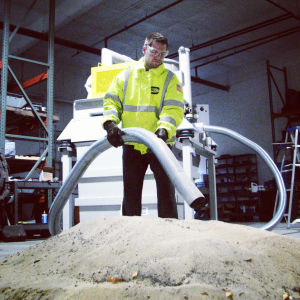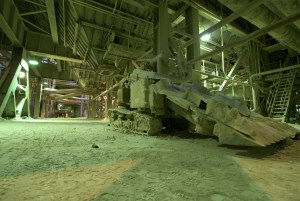Excess materials, fine particulates, liquids, dirt and dust all are a constant factor in manufacturing plants, work sites, food production facilities, and other commercial locations. Over time, these elements become both a safety hazard and tripping or slipping hazards. As well, there are often accidental spills that require quick clean up in order to keep production moving.
 Immediately vacuuming these materials is the best way to keep work areas clean and safe. Whether to rent a vacuum truck rather than make the investment in a permanent facility-based vacuum system is the choice that management faces. So what are the differences between the two options?
Immediately vacuuming these materials is the best way to keep work areas clean and safe. Whether to rent a vacuum truck rather than make the investment in a permanent facility-based vacuum system is the choice that management faces. So what are the differences between the two options?
- Timing of Clean-up: More than likely a plant or facility should be cleaned daily or at least each week in order to stay on top of the amount of excess grime, dust, and dirt that accumulates. With an in-plant vacuum system, it is both easy and cost effective to clean up excess materials, spilled liquids, and other grime on a routine schedule. Renting a vacuum truck would require it to be on site when clean up is needed. And having it on a regular basis would drive the rental costs up. Also in emergency situations, it would take time to locate, rent, ship, and then use a vacuum truck to clean up accidental spills or large accumulations of materials. However, with an in-house vacuum system, clean up could happen immediately.
- Location and Accessibility: With a plant system that is either mobile or has a network of vacuum piping throughout the facility, clean-up equipment can be located close to the actual source of dirt, dust and scrap materials. With a vacuum truck, the length of hoses may not accommodate the desired length needed to reach the most egregious amounts of refuse.
- Equipment Training: With an in-house vacuum system, training will come from the manufacturer and since the equipment will always be onsite, additional training will only be necessary for new employees. With a rental vacuum truck, you may never know what truck or vacuum system that you will get. Therefore, before clean-up can begin, equipment training or reading of manuals will be required before work can be start – adding to overall clean-up time and truck rental costs.
 Volume of Clean-up: A productive factory or manufacturing facility will always be producing scrap materials, production dust, regular dirt and other liquids or dry materials that need to be cleaned on a consistent basis in order to keep the shop environment safe and healthy. This volume of material could easily overwhelm even the largest rental vacuum trucks in one visit, let alone several visits, especially if utilized over longer periods of time. An in-house vacuum system would be configured to accommodate the current and anticipated volume of garbagelike material and easily clean it up on either a daily or weekly basis.
Volume of Clean-up: A productive factory or manufacturing facility will always be producing scrap materials, production dust, regular dirt and other liquids or dry materials that need to be cleaned on a consistent basis in order to keep the shop environment safe and healthy. This volume of material could easily overwhelm even the largest rental vacuum trucks in one visit, let alone several visits, especially if utilized over longer periods of time. An in-house vacuum system would be configured to accommodate the current and anticipated volume of garbagelike material and easily clean it up on either a daily or weekly basis.- Cost of Equipment: Although renting a vacuum truck in the short term will be less costly than installing a vacuum system, over the long term, this installed system would pay for itself as well as provide assurance that the company is adhering to OSHA laws regarding clean-up of combustible dust and materials. In general, an in-house system will provide for an ongoing clean and safe work environment for employees and customers.
Commercial and industrial cleaning is a critical operational aspect for any company. The safety and cleanliness of the facilities and the equipment used creates a safe workplace for all.
Leave a Reply
You must be logged in to post a comment.